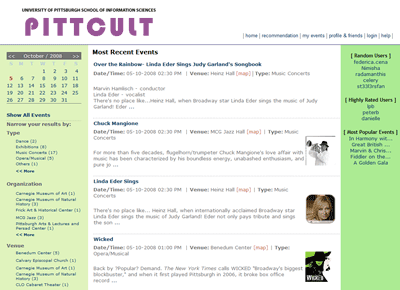Difference between revisions of "Eventur"
From PAWS Lab
(→Link: [http://eventur.sis.pitt.edu http://eventur.sis.pitt.edu]) |
|||
| Line 1: | Line 1: | ||
== Link: [http://eventur.sis.pitt.edu http://eventur.sis.pitt.edu] == | == Link: [http://eventur.sis.pitt.edu http://eventur.sis.pitt.edu] == | ||
| − | [http://eventur.sis.pitt.edu Eventur] (formerly [[PittCult]] is | + | [http://eventur.sis.pitt.edu Eventur] (formerly [[PittCult]]) is an adaptive social system for sharing and recommending cultural event information in the Pittsburgh area. This system utilizes human psychology to conform to opinions of friends. When people go to a music concert or exhibition, they commonly ask their friends' opinions, and invite them to go along. Centered on this trusted human network, users can recommend items to their friends and rate their friends' taste about a certain genre of cultural events. This system is to cope with various problems of traditional collaborative filtering technique such as ad-hoc user problem (users copying other users' profile), data sparsity, black-sheep users and system scalability. |
<br/> | <br/> | ||
<br/> | <br/> | ||
Revision as of 03:22, 15 March 2015
Link: http://eventur.sis.pitt.edu
Eventur (formerly PittCult) is an adaptive social system for sharing and recommending cultural event information in the Pittsburgh area. This system utilizes human psychology to conform to opinions of friends. When people go to a music concert or exhibition, they commonly ask their friends' opinions, and invite them to go along. Centered on this trusted human network, users can recommend items to their friends and rate their friends' taste about a certain genre of cultural events. This system is to cope with various problems of traditional collaborative filtering technique such as ad-hoc user problem (users copying other users' profile), data sparsity, black-sheep users and system scalability.
- For more information, please visit here or contact Danielle Lee
- Publications related with Eventur

